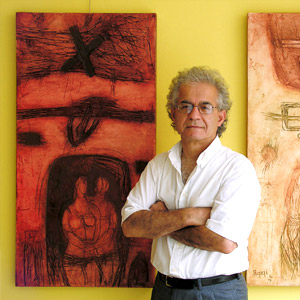Aqiqi (01-04-1946 - 01-10-2014)

Who was Aqiqi?
Aqiqi was born in Baghdad (Iraq) in 1946. He comes from a family with eight children. His father was photographer and in his spare time made sculptures of animals from various materials to make ends meet for his family. For Aqiqi, this was his first acquaintance with the phenomenon "art".
Despite discouragement from his family, he decided to become an artist and started his study at the Faculty of Fine Arts in Baghdad. During his student time he experienced the rise of dictatorship in Iraq. After he finished his studies he decided to leave the country and go to Italy for a supplementary study. After this study in Rome he tried to settle down in Iraq but in vain. This made him decide to go to Libya. Despite the fact that the political situation in Libya was not any better, he lived and worked at the Faculty of Fine Arts at the University of Tripoli, where he founded the Sculpture Department. When the yoke of dictatorship became too much, he had to flee again, this time to The Netherlands where he received assylum and has since settled down in Reeuwijk, near Gouda, where, after a difficult period, he regained his passion and started his artistic work again. Besides many exhibitions throughout the country, he gave lessons at the art school 'Anders Bekeken' in Gouda, where he taught people with a psychiatric background the techniques of painting, drawing and sculpture. But above all he helped his students to regain their dignity and sense of purpose in life.
Aqiqi's art is universal. It appeals to general human thoughts and feelings. It is powerful and fragile at the same time. He worked hard to make his comeback, and his work has been highly acclaimed. He found great pleasure in discovering and applying techniques and new materials. Freedom in art was very important to him and he believed that poetry is the mother of all arts: "work in which one does not feel poetry, is not art work". He did not like the words: biography, career and success.
